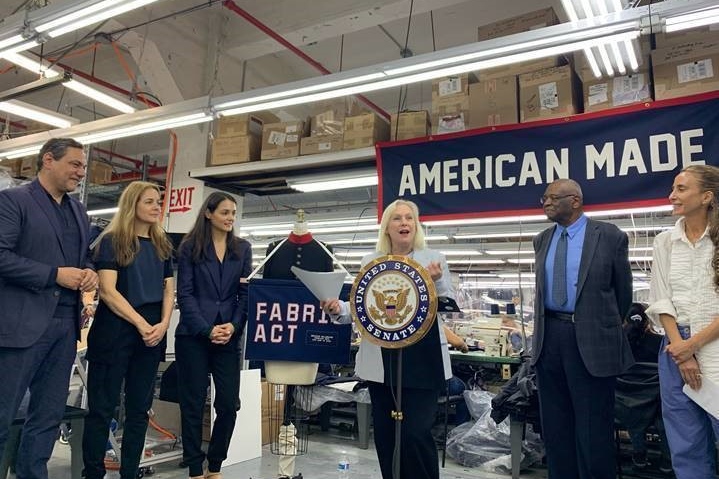
US Sen. Gillibrand introduces FABRIC Act, to protect garment workers
YarnsandFibers News Bureau 2022-05-18 14:30:48 – USASenator Kirsten Gillibrand has sponsored the Fashioning Accountability and Building Real Institutional Change (FABRIC) Act, which she claims would revitalize the US garment sector by strengthening workers' rights, driving wage growth, and promoting equity.
Senator Gillibrand stated during a visit to Ferrara Manufacturing in New York City that the FABRIC Act will thread the needle of preserving workers' rights, ensuring smooth wage and hour enforcement, and promoting an industry that is crucial to the fabric of America.
The FABRIC Act amends the Fair Labor Standards Act of 1938 to create what Gillibrand's office describes as a "historic new set of labor protections for garment workers designed to curb many of the abuses inherent in what it calls industry bad actors," including a prohibition on payment-by-piece-rate compensation schemes as workers' base pay. The measure seeks to guarantee that manufacturers offer a minimum wage as a pay floor, with the option to provide piece-rate compensation in addition to beginning payments.
It also includes new liability standards that hold fashion brands liable for the labor practices of their manufacturing partners in order to promote accountability in the garment sector and push large retailers to become allies in the fight against workplace breaches.
According to a statement released by her office, US garment workers are a cornerstone of the American economy and have experienced "unsafe working conditions, wage theft, and piecework compensation, which frequently prioritizes rapid fashion over worker safety" for far too long.
The statement adds: “Supply chain interruptions due by the pandemic have further worsened these continuing difficulties, which are disproportionately borne by women, people of color, and immigrant workers," the statement continues. By improving working conditions and altering the piece-rate pay structure, Gillibrand's FABRIC Act will safeguard almost 100,000 American textile workers and help revitalize the US garment sector. Women are leaders in the cut-and-sew garment manufacturing business, accounting for 61 percent of employees, despite significant employment losses for women during the pandemic, they need to invest in themselves and this crucial industry.”
Senators Bernie Sanders (I-VT), Elizabeth Warren (D-MA), and Cory Booker (D-NJ) are original cosponsors of the FABRIC Act.
Senator Gillibrand said that it is time for the federal government to take aggressive action to transform the fabric of the American textile manufacturing business. The United States used to have a thriving apparel manufacturing business, and it's time to evaluate how this industry has changed over the last 50 years and rethink how they treat its employees.
From designers to managers to laborers, women disproportionately lead in this vital business." However, garment workers in the United States are frequently underpaid, overworked, and subjected to hazardous working conditions. Protecting the garment workers is a problem of sustainability, with direct implications for environmental sustainability, community development, gender equality, and economic prosperity. This measure would thread the needle by preserving workers' rights, ending abusive pay rates, and assuring equitable remuneration for garment workers, all while making historic investments in domestic garment manufacturing so that we may not only produce but also buy, American.
Sanjeev Bahl, founder, and CEO of sustainable denim company Saitex, is one of the bill's supporters.
Market Intelligence
Ask for free sample Report

experience
Customer Base
dedicated team
Countries Served Worldwide









